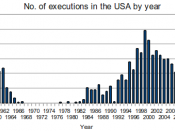The American Heritage Dictionary defines capital punishment as 'the penalty of death for the commission of crime.' The death sentence has been applied since ancient times as punishment for crimes ranging from petty theft to murder. In 1976, U.S. states began creating a bifurcated trial procedure that would legally allow imposing the sentence of death. The states did so in response to the 1972 (Furman vs. Georgia) Supreme court decision which ruled that death penalty statutes were too vague and ambiguous, thus unconstitutional and illegal. The two tier system reserved for capital punishment cases relies on jurors to decide on innocence or guilt. Another jury decides whether or not to impose the death penalty. The vote must be unanimously recommended for the death sentence to be imposed. Jurors, acting in societies best interest, have sent a clear message. Those who are compelled to commit a heinous premeditated murder must be ready to accept the consequence prescribed by law, death.
Nearly 3 of 4 Americans support the death sentence as a form of punishment. The other third has condemned it and their list of claims against it is long. Opponents challenge proponents on issues of deterrence, economics, fallibility, and rehabilitation. Their indifference to capital punishment is founded on constitutional and moral grounds.
Moral Issues:
The sacredness of life has been taught for centuries. One can find it's teachings throughout western history. This reverence for life is often cited to oppose the death penalty. 'Those who base their opposition to the death penalty on moral grounds argue that life is sacred and killing is always wrong, whether it is done by an individual or by the state.' (Honeyman .3) It is safe to say that most of us would agree that our lives are precious, and even sacred. Most...



Excellent
I thought that this essay was very well organized and really focuses on every angle of the argument. Also, I completely agree with the author's point of view. Bravo!
3 out of 3 people found this comment useful.